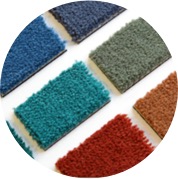Carpet Flooring Material Costs
Carpet flooring is the most common flooring solution across the United States, accounting for more than half of domestic floors, and for very good reason. Carpet floors offer many distinct advantages to the homeowner that are unmatched in most flooring types: A soft feeling, warm floors, minimal noise, increasing the comfort for your feet. But, most of all, carpet floors offer great value, both in terms of price and longevity. Quality carpet floors can last 20-25 years with proper maintenance, making them a great long term investment..
Consumers have many diverse options for carpet flooring materials, designs, installation, finishes, and accessories, making it important that you know exactly what you need so that you get the best bang for your buck. Whether you select your carpet floor by an air tight budget or by the need for extreme durability and performance, this guide will help you from start to finish and make it easy to choose the right carpet floors for your home.
To make the process easier, we will break down a carpet flooring project into its basic components, which can include price ranged, tips to get the best materials, how to find a great contractor, and ways to save money on all aspects of your project.
Carpet Floors Cost by Components
There are four general components that will factor into the cost of carpet installation:
- The Actual Cost of Your Carpet
- Labor Cost
- Material and Supply Cost
- Optional Costs
In addition to the component costs, you will need to choose how you plan to complete your project, which can massively alter your carpet flooring installation cost:
- DIY Problems and Limits
- Contractor Hiring Tips
Carpet cost
Possibly the biggest factor in determining your carpet installation cost is going to be the materials that you choose to use in your project. The great thing about carpet flooring is that there are material choices that fit every taste and budget, ranging from your standard types to more luxurious carpeting.
Selecting the right carpet for you will come down to two overwhelming factors: price and the overall, or long term, performance of your carpet floor. For example, price per square foot (sq ft.) might vary from $1.50/sq ft. to $20.00/sq ft., meaning that the cost of the carpet alone for a single 250 sq ft. room can range from $375.00 to $5,000.00, and this is without installation or other “behind the scenes” costs. Each carpet material type holds advantages, disadvantages, and, of course, a cost. Understanding your needs and picking the right carpet floor materials for your project will save you significant amount of money while still satisfying your needs. Here are 10 most common types of carpet floor materials which you can choose from during your project.

Types of Materials (fabrics)
-
Acrylic:
Commonly found in area rugs, acrylic carpet fibers are notable for their spongy feel and resistance to stains, mold, mildew, and moths. Acrylic fibers are easy to clean and dye, and are fade resistant. However, they are subject to pilling, and as the closest material to high-cost wool, are a more premium fiber, which can increase your carpet install cost.
-
Cotton:
Also used in area rugs, cotton carpeting is notable because it is incredibly soft. However, like cotton garments, these carpets can stain easily and are subject to fading, making them a poor choice for homes with young children or pets. Cotton carpeting also tend to be priced much higher than synthetic fiber alternatives, leading to very high average carpet installation cost.
-
Nylon:
Used in 65 percent of all carpets sold in the United States, nylon fibers are a great option because they are extremely durable and simple to clean, making nylon based carpets ideal for families with kids and indoor/outdoor pets. Frequently used in the construction of mid-price carpets, nylon is notable for being the strongest type of carpet fiber, and, therefore, is used in high-traffic areas. While also resistant to mold and mildew, nylon carpets are subject to static, and often receive an anti-static treatment prior installation. There are two different types of nylon used during manufacturing:
- Type 6 Nylon: Considered the value fiber, type 6 is often unbranded and may only meet minimum construction requirements and can have inconsistent fiber quality.
- Type 6.6 Nylon: The premium fiber type, Type 6.6 nylon is recognizable due to its branding—DuPont nylon, for example).
-
Polyester:
Well-known for its beautiful color applications, polyester carpet fiber also resists fading and wear over time. The fiber itself is also resistant to mold and mildew and is generally considered non-allergenic. However, the quality and density of the polyester weave can vary from brand to brand. As a result, some polyester carpets are especially susceptible to tracking and crushing, making them a poor choice for high-traffic areas. To get the most out of polyester carpet, look for higher-density construction and lower profiles, but higher twist levels. Avoid high piles, low density, and "blown" yarns, all of which tend to show wear more quickly. (Consult your contractor for pricing)
-
Polypropylene or Olefin:
The fastest-growing fiber in carpet construction, at least in terms of usage, polypropylene, or olefin, is now used in about 30 percent of all carpets manufactured in the United States and has many of the same characteristics as polyester. Notable for its incredible ability to resist stains, polypropylene also resists bleaching and sun fading while maintaining its color, due to the fact that it is solution-dyed rather than topically dyed. Olefin is also moisture resistant, reducing the occurrence of mold and mildew, making it one of the most durable carpet types that there is. Buyers are most likely to find olefin fibers in Berber or loop pile carpet, which do well in high-traffic residential areas as a cheaper alternative to nylon. (Consult your contractor for pricing)
-
Wool:
The most traditional choice when it comes to carpet material, wool is a premium carpet fiber notable for its deep, rich look and luxurious feel. Along with an incredibly high price tag, homeowners who opt for wool should expect a durable, stain-resistant product. Because it is a natural fiber, wool is more susceptible to fading and static However, wool actually absorbs moisture, Which can lead to mold and mildew development in wetter areas, such as a basement.
-
Triexta:
One of the newest fibers on the market, Triexta's special properties help enable it to resist crushing. Triexta can also be cleaned easily while resisting soil and water-based stains. With a natural springiness to it, Triexta also holds up well in rooms that see frequent use. It can also keep your Plush & Texture Carpet's pile soft in the face of repeated traffic. (Consult your contractor for pricing)
-
Carpet Padding:
Plush & Texture Carpet, like most carpets, benefits from a layer of padding beneath its backing. Padding can limit the echoes created by frequent footsteps in high-traffic areas. Your Sales Representative will discuss padding needs with you and determine your best choice for comfort, noise reduction and warmth. (Consult your contractor for pricing)
-
«Green» material:
- The hottest growing carpet material, both in terms of consumer demand and manufacturing level, are known as «green» carpets. In terms of carpeting, green means constructing carpets that are sourced from the ultimate manufacturer - Mother Nature. The commitment to crafting 100% natural fiber carpets and area rugs is unsurpassed in the industry. Our products use either raw natural colored wool or OrganoSoftColor™ dyes, which are completely organic. We apply absolutely no toxic stain, fire retardant treatments, or mothproofing chemicals, period. We only produce 100% natural wool floor coverings that are both innovative and high quality, and can be used for both residential and light commercial applications. (Consult your contractor for pricing)
- Bio-Floor™ Carpet: Passion is what initially drove us to manufacture this product. We are passionate about manufacturing the healthiest carpet available, both for your home and for our environment. That product is Bio-Floor™. We understand that passion is what drives our customers as well. They are passionate about their family's health, the health of their pets, and their overall home health, and they refuse to settle for the pseudo-green marketing ploy that is prevalent in today's floor covering arena. Our customers put health first, and they understand the long term importance of the products they bring into their home. Earth Weave has been supplying that passion for almost 20 years now with our truly unique Bio-Floor carpet line. Bio-Floor uses natural materials without harsh chemical treatments or toxic mothproofing. Just like our customer's, Bio-Floor is unique and focused on health. It is made to meet those healthy demands. We salute and thank all of you out there for choosing health above all else. (Consult your contractor for pricing)
- EARTH WEAVE is the premier North American manufacturer of all natural, non-toxic carpet, area rugs and padding. With the growing concerns for the environment, indoor air quality and the large numbers of newly diagnosed cases of chemical sensitivity, Bio-Floor is quickly becoming the health conscious consumer’s floor-covering of choice. Our products are made using undyed, untreated wool on the face, along with hemp, cotton, jute and natural rubber for the backing materials. (Consult your contractor for pricing)
- Carpet Floor Installation Cost Calculator
- Carpet cost
- Indoor vs. Outdoor Carpet
- Carpet Flooring Styles (Pattern)
- Carpet Characteristics (texture)
- Places Where Homeowners Can Install Carpet
- Carpet Maintenance
- Where Homeowners Can Buy Materials
- Carpet Floor Installation Labor Cost
- Carpet Floor Additional and Optional Costs
- Contractor hiring



Comments
Comments are disabled for this post